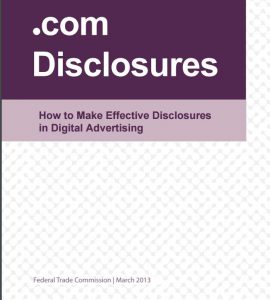Affiliate Marketing and the FTC
You get quite a few blended reactions regarding how an internet site needs to use marketing disclosures. The Federal Trade Commission (FTC) has compiled a nice guide titled, “How to Make Effective Disclosures in Digital Advertising”. You can review this guide to get a better understanding of the disclosure requirements to see why disclosures are vital for SEO. The industry of affiliate marketing and the FTC play a role in the arena of marketing disclosures.

Affiliate Marketing Disclosures
DISCLAIMER: Because I am discussing the Federal Trade Commission requirements in this article, I want to make it perfectly clear that I am not a legal professional. I have no experience as a Legal Analyst, Attorney, Paralegal or any other profession that deals with legal issues, civil or criminal. I am not providing any legal advice here.
Many bloggers and influencers no longer use them because the FTC goes after the brand instead of the bloggers. But, hold on because Google threw a monkey wrench into disclosing relationships earlier this year also.
Google launched some new procedures stating that you have to follow the FTC advertising disclosure guidelines if you receive products or review them for merchants. It’s basically directed to bloggers and those whose websites are essentially sites that review products.
We can bet that Google will probably revise their procedures to broaden their scope to include affiliates and other websites that receive compensation. This revision could very well include other websites that use affiliate links but do not disclose their relationship with the merchants.
Google first announced the marketing disclosure guidelines on the Google Webmaster Central Blog on March 11, 2016, for blogging sites and websites that write product reviews. The difference between the FTC Guidelines and the new Google requirements is that the FTC is slamming the brands but, Google is penalizing the bloggers, affiliates and the influencers who do not disclose their relationships with advertisers (merchants).

Google jumped on the bandwagon.
If you depend on traffic from Google and don’t comply with the FTC and Google’s guidelines, you may be subject to a manual penalty from Google, which is very difficult to get overturned. This will cause your traffic to tank and could ultimately be the death of your website.
The Importance of Disclosure Placement
Now that Google has jumped on the bandwagon with FTC, you may want to take a concerted effort to place your disclosures properly. Google is forever updating and changing the algorithms and how the search engines crawl websites and map the patterns and similarities that it finds while crawling.
Google looks at the code and how it looks to the users. For that reason, placement of your disclosure is crucial. If you are hiding the disclosure at the bottom of your article or down in the footer, you may be hankering for a penalty down the road.
That is exactly what the FTC says should not be done. And, it appears that Google is backing the FTC’s guidelines. That is a good enough reason to ensure that you are in compliance with disclosures as per the FTC guidelines in addition to the placement of it.

Things that make you go Ummmm
Ways Google Can Tell if You are Compensated
Because Google reads the code, it can be determined where the disclosures reside on your website. They will be aware if you try to hide them in drop downs or footers.
Google can crawl and follow links and it looks at the page you are sending visitors to. Even if you are using cloaked links Google can still see what you are doing and you can still be mapped.
Certain words used in your content such as “advertising disclaimer” and “FTC disclosure” can result in you being grouped with others. So, you should whether you are using “do follow” or “no follow” on the older articles with affiliate links where you are compensated.
It may be a good idea to add disclosures even when you are not doing any paid reviews, but have associated yourself with a website that is doing product reviews or you can be grouped and can be mapped for that group.
It’s a good idea to be proactive rather than reactive in the event that Google does decide to implement manual penalties for disclosures.
Be Ready if Google Decides to Issue Manual Penalties
First, don’t sweat the requirement to disclose your compensation relationship with merchants (advertisers). It’s not a big deal. Basically, simply follow the guidelines of the FTC and Google and you should be in compliance.
If you feel unsure of yourself in this area, you can always hire an attorney to prepare the disclosure verbiage and you can outsource and SEO expert to coach you on where to place the disclosures or have then expert place the disclosures for you to ensure you are in compliance with the guidelines.
Once you have conceded to implementing the appropriate disclosures it is time to create a brief and straightforward statement that clearly acknowledges your relationship regarding compensation from advertisers (merchants) to promote their products and or services.
The final action is to make certain you have created a Google Search Console account. Make sure your website is listed there because you can obtain some details about your site. Most importantly, this is the tool where Google will let you know if you have received a manual penalty. This is a free Google tool to take advantage of it.

Google Webmaster Tool can tell you if you have any manual penalties.
Conclusion
I can’t wait to see how Google reacts to disclosures being compliant and accurately placed. There are boatloads of large websites owners who have monetized sites but are not in compliance with the disclosure guidelines. Affiliate marketing and the FTC along with Google all on one accord working towards the compliance of marketing disclosures is a good thing.
In the near future, we could see another flourish of changed algorithms from Google in reference to the adherence to proper disclosures. The new algorithms could tank a lot of the large websites that have not conformed to the guidelines. It has happened before!
At the expense of the larger website owners, this can be a massive chance for smaller websites owners to take advantage of the opening to progress in the page rankings and also expand their brands in the process.
Compliance with the FTC and Google disclosure guidelines is vital to search engine optimization because if you fail to implement the necessary disclosures and manual penalties are implemented by Google, you will lose Google traffic and your page rankings will tank. Pop goes the weasel (if you get my drift)!

Be Proactive. Get ahead of the game.
Please feel free to contact me if you need help with anything. Just make a comment below or you can always get in touch with me through wealthyaffiliate.com (here is a link to my profile).
Verna
Founder of Your Trusted Affiliate
momstrustedaffiliate.com
email: verna@momstrustedaffiliate.com
Hello Verna,
This is a great topic your discussing. When I was planning on adding an affiliate disclosure on my site I discussed about it at Wealthy Affiliate’s live chat.
There were people saying it is something that’s required and others were saying that there country or state did not have to comply with these guidelines.
I felt that since most of my articles have affiliate links attached, it would be safer just adding a disclosure for the sake of safety.
So I published my affiliate disclosure on a page and added it to my side menu but did not allow google to index it.
Is this OK, it’s not difficult to find my disclosure.
~Benji~
Hi Benji,
I think you made a good choice by adding your disclosure. It’s better to be safe than sorry! I would like to make one observance. You said you added your disclosure to your side bar. Please clarify. I understand your statement as that you created a disclosure page and put that page in your side bar, but you didn’t let Google index it.
According to the FTC, putting the disclosure in the sidebar is not sufficient because they say that the disclosure must be close and above the affiliate link. The reason being, is that the visitor may not scroll enough to even see the disclosure..
Why wouldn’t you want Google to index your disclosure page? To me, if Google indexes the page it is confirmation to them that you do have a disclosure and it may help eliminate any changes of getting a manual penalty.
I am in the process of going through my pages/posts to make sure I have my disclosure placements done correctly. I actually put my disclosure at the top of my sidebar because that way it can be seen immediately and also because the first banner ad in the sidebar is Amazon. Since the disclosure must be over the affiliate link, it made since to put it first in the sidebar.
The disclosure must be in close proximity of the affiliate link. Therefore, since I have a link embedded within my page, I included a disclosure sentence above the affiliate link within the page. Within the page, a sole sentence is sufficient as a disclosure (says the FTC) as long as it is close above the link.
It’s important not just to have a disclosure, but to make sure it has the appropriate wording and correct placement of that disclosure.
Here is my updated Jaaxy review to show you how my disclosure appears within the content. I’m sure you saw the main disclosure in the sidebar.
Thanks for your comments and I am glad you found the post to be helpful. Let me know if you have any questions I can help you with.
Verna
This is a great article. I used to evaluate websites for a company and one of the things we had to check was to look for stuff like this. It was even more important if the site had to deal with a persons health, wealth, or well being. It’s better to be safe than sorry in these situations.
Thanks Vickie,
I am still going through all of my articles to make sure I have the disclosures with all of my affiliate links. It will be easier with any new article that I write because I know ahead of time that I have to include them.
Many people think that they can just add a disclosure anywhere, but the FTC requires specific placement as well as the correct wording.
I’m glad you for the article to be useful.
Thanks for stopping by and I appreciate your comments. Let me know if you have any questions I can help you with. Come back again anytime.
Cheers,
Verna
Hi Verna,
Thank you for providing the guidelines. I have a post it note on my desk right now as a reminder to go through my sites and post my affiliate disclosure. I will make this my top priority instead of procrastinating anymore.
Do you think it’s better to have the full disclosure on the sidebar or on a separate page of the website?
Thanks for sharing this info,
Kris
Hi Kris,
I’m glad you decided to put this tasks in your “active” things to do list. We don’t know when the time will come that Google to take enforcement action. For all we know, some may already have taken a hit.
I think it is a matter of opinion whether to create a separate page for the disclosure or to put it in the sidebar as I have done. I’m on a band wagon to really try to be transparent to my visitors to try to dispel the negative reputation that some bad apples have caused some to think “not so nice” about affiliate marketers. Take a look at another article I wrote,How to Get Rid of a Bad Reputation.
https://momstrustedaffiliate.com/how-to-get-rid-of-…
I also do it because there is no question for Google to determine that I am in compliance with the disclosure.
Don’t forget, you also need a statement immediately above the actual affiliate link as well, but you only need to do it one time and it can be a single sentence.
Thanks for taking the time to drop by. I’m glad you found the article useful and it got you to take the action needed.
Let me know if there is anything I can help you with and I hope to see you again soon.
Cheers,
Verna
Thank you for this very insightful information. Right now my disclosure of compensation and earnings as well is my privacy are in the footer menu in the bottom. Hopefully, this is the right place for them. I have also heard not only does Google check for that, but Amazon also looks to make sure that that’s there. Is this true?
Hello Jagi,
Check out the FTC Disclosure Guide because it is very specific about the placement of the disclosure statement. Your disclosures are supposed to be above the affiliate link. If you have more than one affiliate link on your page you only have to do one disclosure but it has to be near and above the affiliate link. Based on the FTC guidelines the disclosure statement can’t be in the footer. If you put it there, a visitor may click on your affiliate link and never even get to your footer to see the disclosure statement. It is possible to still get penalized for it being there so you may want to reconsider and make proper adjustment to your pages. It’s better to be safe than sorry.
Thanks for dropping by and reviewing my article. I glad you found it to be useful. Let me know if I can help you with anything else.
Cheers,
Verna
Hello Verna,
Thanks for sharing this article especially for newer bloggers like myself who are not very familiar with these things.
When I first started, I was told to include that page, but I had no idea why and you clarified this very well.
I am going to share this page with all of my blogger friends just so they are informed.
Thanks,
Eric
Hi Eric,
Glad you found the article useful. I try to write article that will help new marketers. I know I certainly had many questions. internet marketing is something that we will have to stay on top of because things change pretty fast and what worked last year may not work this year!
Thanks for sharing my article. I really appreciate that.
Come back any time and let me know if I can be of help to you.
Cheers,
Verna